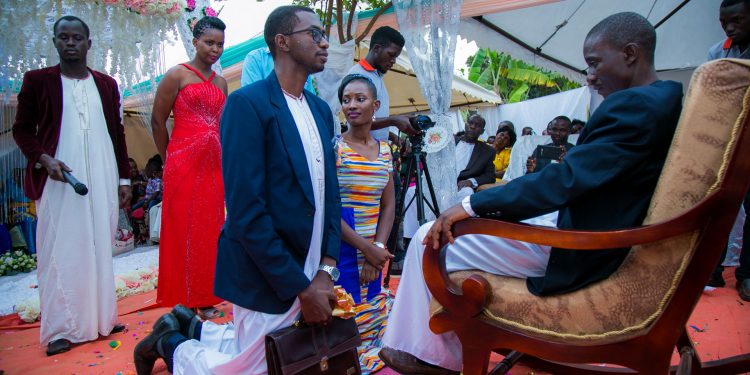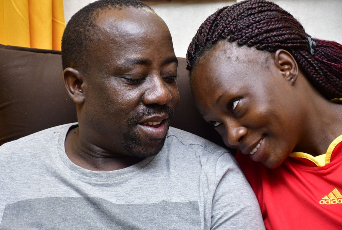By Maria Immaculate Owechi
On September 30, 2012, Agataliko Nfufu on Bukedde TV aired a story where the groom, Raymond Muwanguzi was denied the chance to take home his bride, Elfrance Nakintu because he failed to pay bride price (known as mutwalo in Buganda culture) and other gifts. He only brought a Buganda kingdom Certificate, which angered the relatives of the bride.
The groom explained to his father-in-law that he failed to bring the full bride price because of financial constraints. But the elders would not listen because the mutwalo is what gets the bride married. They said that even if he had not brought other gifts, the presentation of the mutwalo would be enough to seal the marriage.
What the mutwalo is
The mutwalo is a key bride price requirement requested by the bride’s father before accepting the groom to get his daughter’s hand in marriage on the day of the kwanjula (which means introduction).
It is the name given to anything a bride’s father mentions that a man should bring as bride price. As long as that is fulfilled, culturally, a man is allowed to take his bride. If a man brings a lot of gifts but skips that particular item his father-in-law to be wanted as bride price, the family of the bride holds the right to deny him their daughter’s hand in marriage.
The mutwalo is characteristic name among the Baganda and Basoga. Among other tribes in Uganda, it has different names to mean the same.
Twaha Mukisa, an events manager and master of ceremonies (emcee) for introductions, weddings and anniversaries, explains that a man cannot claim a woman as his bride, before her family, without payment of the mutwalo.
History of mutwalo
According to Mukisa, the mutwalo started since time immemorial but earned its name (which means ten thousand) in the colonial days when people started to use Indian rupees as a currency in the exchange of goods. The groom had to give in 10,000 rupees, which in Buganda was called “lupiiya”. After lupiiya, the East African currency took over and in 1966, the Ugandan shilling was introduced. The constant was that in whichever currency, the bride price was 10,000 in monetary cash.
“Back then, it was so hard for someone to get a ten thousand shillings note which made the mutwalo a big thing among the bride price requirements,” Mukisa explains.

Mutwalo in today’s kwanjula ceremonies
“Today, the mutwalo remains but it is no longer money but material items like art pieces or portraits of one’s clan, sofa sets, fridge, water tanks and many other items,” he adds.
He illustrates that for some multi-cultural families like the westerners, they could ask for animals like cows.
Other families can request for unique items. For instance during one of the ceremonies Mukisa officiated, the family requested for two ancient wooden sandals called, obugatto bw’obukalabanda in Luganda. Another requested for an ancient Buganda chair called, “mwasajutte,” he recounts.
Nonetheless, other families may request the groom to bring anything of their choice.
Religious view of mutwalo
Mukisa emphasizes that the mutwalo can never be under looked because even in religious denominations, whether Christians or Muslims, the couple are expected to present the recommendation letters from the parents before being joined in holy matrimony.
“So, if the groom did not give his father-in-law the mutwalo, then why would he expect to be given the recommendation letter?” he asks.
Reverend Micheal Mukhwana, of All Saints’ Cathedral, Kampala says that the recommendation letter from the parents is important because marriage is not just between two individuals but both families.
“The authority of the parents is important because they give the needed blessing for the marriage to succeed, “he explains.
He gives an example in the Bible where in Genesis, the servant of Abraham on behalf of Isaac, the groom, had to first seek permission from Rebecca’s parents and also gave them some gifts before taking her home as the wife to his master.
Mukisa further warns that the consequences of failing to pay the mutwalo is the groom being sent away without his bride because they have not fulfilled the most important requirement in the function “But for lenient families, they could consider making the groom write an agreement stating the exact date at which the groom will bring the mutwalo. That means the bride has been taken on loan,” he explains.
He advises intending grooms to make the mutwalo, the number one item on list before buying other accompaniments.










